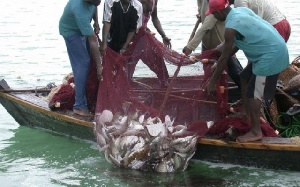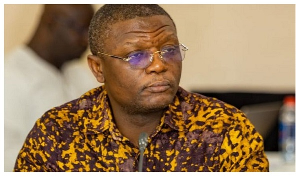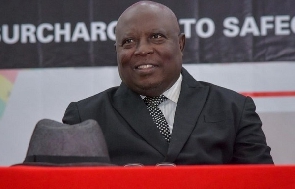Over a month after the opening of the closed season by the Ministry of Fisheries and Aquaculture Development, artisanal fisherfolk in Tema are yet to see any improvements in their catches after near-empty nets.
Nii Mattor, Chief Fisherman of Ashaiman, said fisherman at the Tema Canoe basin have not made enough catch as expected and as promised of bumper harvest after the closed season.
Speaking in an interview with the B&FT, Nii Mattor stated categorically that the closed season had not favoured them but rather foreign vessels, adding that a second look must be taken in the coming closed seasons.
“We have agreed to have the closed season because we learnt that it would be better for us, but it has rather failed us. It seems the closed season meant for artisanal fisherfolk has rather come to help the Chinese vessels, which made lots of catch when we were in our houses. How do the small fishes grow and multiply?
“Let’s sit down and rethink this process, because since the ban was lifted fishermen go and come back empty or with little catch. We have realised that the closed season cannot help us and decided we must sit down properly on the matter.”
Reacting to the issue of foreign vessels taking over Ghanaian waters, the Minister of Fisheries and Aqua Culture Development, Naa Afoley Quaye, explained to the B&FT that the sector does not operate foreign vessels in Ghana, and all vessels are Ghanaian-flagged.
She said the Ghana Maritime Authority (GMA) registers all vessels imported into the country and the Fisheries Ministry licences them for operation – with an observer on every vessel to monitor and control their activities; and they ensure regulations are complied with while those that flout the law are prosecuted, and some licences are being revoked.
“If you import a vessel from Korea or China, it does not mean it is a foreign vessel; all vessels in Ghana are owned by Ghanaians, so they are all under our control,” she stated.
Responding to concerns of the canoe fishermen of not reaping enough benefits from the May-June closed season, the sector minister further explained that the reason for the closed season is to allow pregnant fish to spawn and juvenile fish to grow, and the actual peak production period is in August-September.
However, she explained that all efforts to convince the artisanal fishermen to observe the closed season in August-September proved futile, and rather they insisted on May-June – hence the inadequate benefits.
“When the canoe fishermen complain of not having enough benefits from the closed season it is simply because they chose to have the season in May-June instead of August-September as given by the ministry,” she said, encouraging them to instead observe the closed season in August-September.
Director of Monitoring, Control and Surveillance at the Fisheries Commission in Tema, Alex Sabah, debunked misconceptions among local fisherman about the trawl industry whereby Ghanaian-owned vessels being manned by Chinese are taken as foreign vessels. According to him, all trawlers are owned by Ghanaians – but as the result of lacking technical expertise on the part of Ghanaians, the vessels are handled by the Chinese.
“There is a misconception when it comes to the trawl sector. We have 100 percent ownership in the trawl sector, and those vessels they see are Ghanaian-owned with Chinese manning them.”
He said his department ensures close monitoring of both trawlers and tuna vessels at both Takoradi and Tema Ports respectively, especially in the Exclusive Economic Zone (EEZ) which is Ghana’s territorial waters and beyond.

















